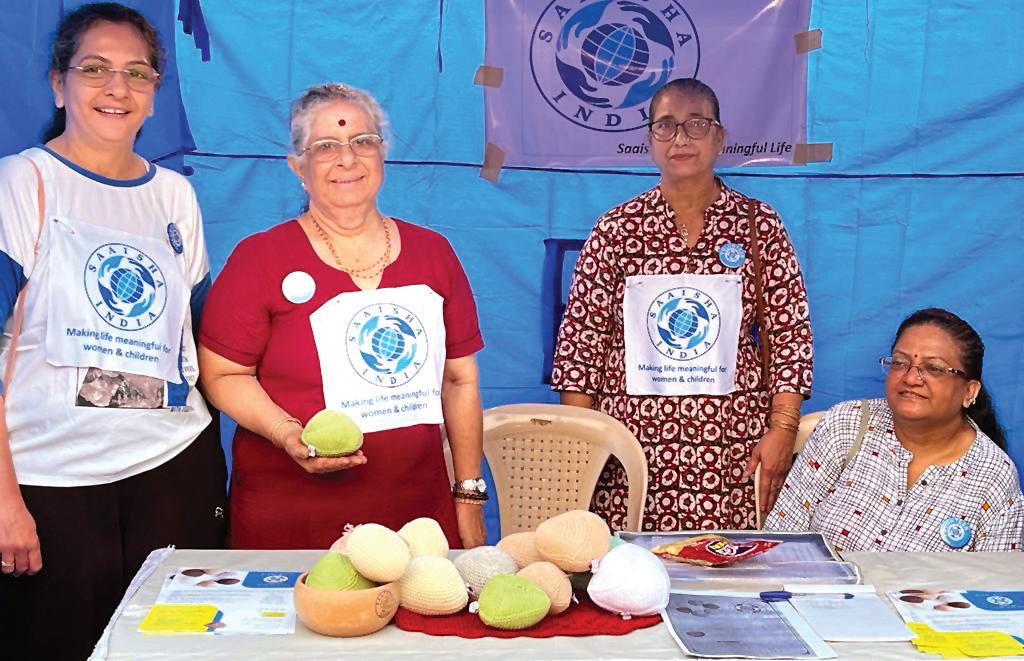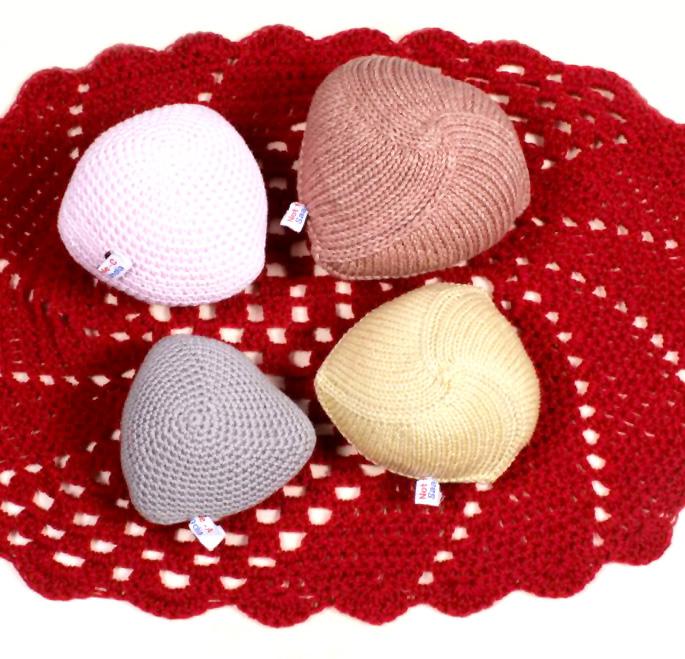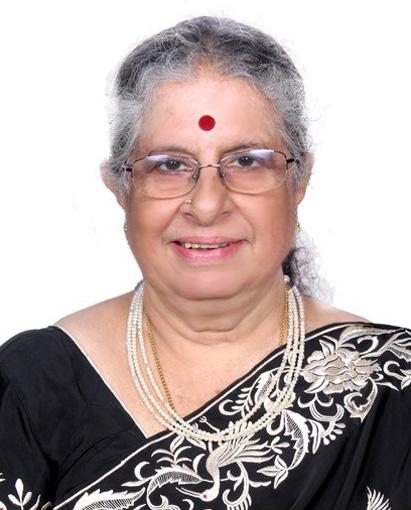
5 minute read
Knitting hope and love for breast cancer survivors
Breast cancer diagnosis is invariably followed by months of gruelling treatment and uncertainties. To top it all, women who have mastectomies may experience fear, dejection, despair, and a negative attitude about their bodies.
But, here’s crusader Jayashree Ratan, who made it her mission to stand by mastectomy survivors and let them know they are not alone. Her kindness and empathy have earned her an army of fans.
Advertisement
Ratan’s quest to ease the lives of mastectomy survivors began in 2018 when she spoke to a relative who had undergone the procedure. In a chat with Pink, Ratan recalls that she had asked her what she was using after the mastectomy. Her relative told her that she was stuffing her bras and blouses with handkerchiefs and dupattas.
“All this was not easy as the skin had been exposed to surgery and rashes and infections would occur frequently. I then asked if I could send over some knitted knockers to her,” said Ratan.
Ratan had stumbled across knittedknockers.org during a trip to the USA. Knitted Knockers, is an organisation comprising volunteer crocheters and knitters, who dole out free knitted knockers – handmade breast prostheses—to women who’ve had mastectomies and other procedures. Traditional silicon prostheses may be costly or burdensome. Knitted knockers are snug and comfy. When placed in a bra, they take the shape of a real breast.
Mastectomy is a painful process and many breast cancer survivors feel embarrassed. But, crusader Jayashree Ratan teamed up with knittedknockers of the US to knit and send handmade breast prostheses to breast cancer survivors. Today, she has a legion of grateful women who have now regained their confidence thanks to her efforts.
Nivedita Choudhuri speaks to the empathetic Jayashree Ratan
They are a good solution for those who choose not to go in for reconstruction surgery. Ratan thought that in India, they can be a blessing for poor women who would not have heard of reconstruction surgery and would not be able to afford one either.
Ratan, who worked as a banker for 18 years and then as a teacher for around six years, was fond of doing good from childhood. She would team up with her parents and sundry relatives to organise food donation drives. She visited organisations such as Mercy Home and Little Sisters of the Poor to read to children. The post-graduate degree holder in economics would collect household items and groceries from her students and distribute to the poor before Diwali.
She travelled all over India, thanks to her father who had a transferable job and had to resettle in a new location every two years. After marriage too, her husband had to relocate every two years. The frequent transfers broadened Ratan’s mind and made her even more eager to reach people.
They began their venture with four volunteers in 2018. Now, there are over 350 volunteers based in India, UAE, Kuwait, Oman, and Singapore who knit or crochet the knockers. “We have distributed around 10,000 knockers to patients so far. There are no targets for volunteers, and it takes around four to six hours to make a knocker. Our products are not for sale —we hand them out for free,” explains Ratan.

They use 100 per cent mercerised cotton for the knockers, she says. Branded yarns are not suitable for their products and their volunteers get the yarn from approved vendors. The knockers are available in cup sizes A, B, C, D and E. After they are knitted or crocheted, they are filled with virgin polyfibres. The knockers are always overfilled but they can be resized by the patients who may take out some of the fibre and keep it separately. The fibre can be put back when the patients have used the knockers and washed them a few times.
“Our patients test the products initially and give us feedback. They are supposed to last around 18-24 months. We give one pair of knockers to a patient who has had a single mastectomy and two pairs to whoever has had a double mastectomy,” explains Ratan.
“I knitted a pair of knockers and sent them over to my relative. She phoned me in tears soon after. But these were tears of joy despite the difficult time she was facing. She said she had never felt better and wondered if I could make knockers for women going through the same situation as her,” recounts Ratan, who had always done a lot of handiwork, be it sewing, weaving or beadwork.
She called a few friends and mooted the idea of making knockers for mastectomy patients. “Everybody thought it was a great idea. I registered with knittedknockers.org and became their provider in India. And so, Saaishaa India Foundation (saaishaindia.org) was born. Saaisha signifies ‘meaningful life’ and it seemed apt to have this name for our foundation because we wanted women to lead meaningful lives after their mastectomies,” relates Ratan.
In 2018, Saaisha India Foundation gave out around 250 knockers that year. Today, they make around 250 knockers every month. There is no shortage of knockers, which need to be washed by hand to make them last longer. Patients may get another pair when the earlier ones wear out. Instruction sheets are provided with the knockers with information on how to wash and care for them.
Their main dispatch centre is in Mumbai. “We are contemplating having another dispatch centre in south India. Initially, we shipped knockers mainly to older women, but we have started to notice, of late, that a lot of ladies aged around 30 or 35 years are requesting us for these knockers. Breast cancer is spreading among women in their 30s,” points out Ratan.
By 2020, they had enough volunteers. Many were breast cancer survivors who wanted to ally themselves with their cause.
During the lockdown, they held online training sessions for knitting and crocheting and their newer recruits benefited from these sessions, she says.
Saaisha Foundation began their venture with four volunteers in 2018. Now, there are over 350 volunteers based in India, UAE, Kuwait, Oman, and Singapore who knit or crochet the knockers. They have distributed around 10,000 knockers to patients so far

They posted the samples they made to the trainers who were then able to correct them. They also make chemo caps and beanies for children. These are made by their younger volunteers, who may be as young as 14 or 15.
“Our older volunteers, on the other hand, are septuagenarians and octogenarians. Our helpers are a truly passionate and committed lot. This organisation will not function if it was not for their hard work and dedication, “ says Ratan.

Other than knit, crochet and stuff knockers, the volunteers maintain databases, accounts, webpages, and social media accounts. They pour over feedback from patients, design flyers and leaflets and create awareness videos. One volunteer knitter in Singapore gets her yarn from USA and dispatches her products to India. An 80-year-old volunteer comes up with 30 pieces every month, says Ratan, who had to tell her to take it easy, but she refuses to listen to her.
Breast cancer patients need loads of fortitude and strength to get over their ordeal. For somebody who has had a mastectomy, there’s additional embarrassment and discomfiture to deal with when facing the world. Saaisha’s knockers—lightweight, breathable, and soft against the skin—provide slivers of hope to thousands of distressed women. They may be stuffed with polyfibres, but what they are really filled with is love and optimism.







